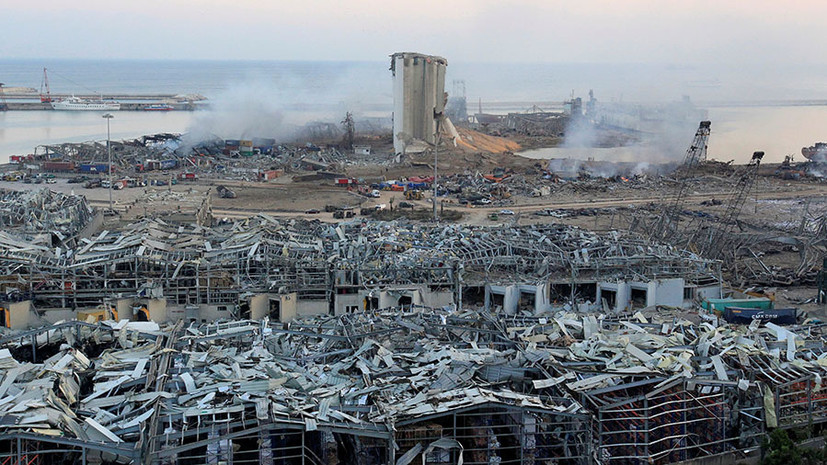Lebanese media cite data from the Ministry of Health, according to which the number of victims of the explosion in the port of Beirut has grown to 137 people. Over 5 thousand people were injured.
Recall that a powerful explosion occurred in the Lebanese capital on August 4. According to preliminary data, the cause of the incident was the detonation of over 2.7 thousand tons of saltpeter, confiscated from the violators and stored in the port of Beirut.
The Jordanian Seismological Observatory has determined that the explosion is equivalent to an earthquake of magnitude 4.5.
Shortly after the incident, Lebanese Prime Minister Hassan Diab called for an investigation into the causes of the explosion and bring those responsible to justice within 48 hours.
“We call for the formation of a commission to investigate the explosion in Beirut, so that the results of the check are made public within 48 hours,” Prime Minister Al Jazeera said.
Diyab also called the "improper storage of 2,750 tons of ammonium nitrate over six years" in a warehouse in the port of Beirut as unacceptable, Lebanon 24 reports.
The Lebanese Supreme Defense Council has declared Beirut a disaster zone. Wednesday, August 5, was declared a day of mourning in memory of the victims of the explosion. Lebanese Interior Minister Mohammed Fahmi promised to identify the culprits and conduct a transparent investigation of the explosion in the port in five days.
Roskosmos posted on its Twitter page a photograph of the aftermath of the explosion in Beirut, taken from the Russian satellite for remote sensing of the Earth, Kanopus-V.
The aftermath of an explosion in the port of Beirut on August 4, 2020. Photo from the Russian satellite for Earth remote sensing "Kanopus-V" pic.twitter.com/JW5A6J4fy0
- ROSCOSMOS (@roscosmos) August 5, 2020Aircraft of the Ministry of Emergency Situations
Meanwhile, two of the five Russian Emergencies Ministry planes have landed in Beirut, which the department sent to eliminate the consequences of the explosion in the capital.
"The plane Sukhoi Superjet 100 delivered a task force of ten people to Beirut, as well as 19 specialists from the Centrospas detachment and two psychologists from the Ministry of Emergency Situations to provide assistance to victims of the explosion in the port," the ministry said.
Earlier, the Ministry of Emergency Situations said that five planes with a mobile hospital, doctors, rescuers and Rospotrebnadzor employees with a laboratory for detecting COVID-19 were sent to Beirut.
The ministry noted that all specialists sent to Lebanon are equipped with special suits and protective equipment, taking into account the epidemiological situation for coronavirus infection.
Damage assessment
The Beirut authorities believe that the damage caused by the explosion could reach $ 15 billion. According to the Governor of Beirut province Marwan Abbud, "half of Beirut is partially or completely destroyed."
According to the Lebanese media, the administration of the port where the explosion occurred was placed under house arrest pending clarification of the responsibility of specific officials for the incident.
At the same time, the head of the port has already stated that there was no pyrotechnics near the exploded hangar. Note that the explosion of pyrotechnic goods was one of the first versions of the disaster in Beirut, which was later denied by the authorities.
He added that saltpeter was stored in the port in accordance with a court decision, but the port authorities did not know that the substance was so dangerous.
As Russian Ambassador to Lebanon Alexander Zasypkin noted, the explosion in the port of Beirut occurred in connection with flagrant safety violations.
“According to the most convincing data, during the repair work, there was a fire, and then a monstrous explosion of the hangar, in which ammonium nitrate confiscated from the damaged ship had been stored since 2014, so we are talking about flagrant violations of safety measures,” the diplomat told RIA Novosti.
In his opinion, the incident occurred due to "an obvious oversight and negligence of the control authorities." The ambassador added that “the issue of disposal of explosive nitrate was regularly put on the agenda”.
Mikhail Alaeddin, head of the Rossiya Segodnya bureau in Lebanon and Syria, spoke in the RT stream “Beautiful Russia boo-boo-boo” about the first minutes after the emergency in Beirut. According to the journalist, at the time of the explosion, he was on a boat at sea about a kilometer from the place of detonation.
“At first there was cotton, white smoke came out, we even thought it was another demonstration: blocking the road, setting fire to tires and so on. That was the first opinion, ”the journalist said. According to him, the explosion took place after about a minute.
“After, probably, a minute, this huge explosion sounded, the blast wave threw our boat a little, everyone who was in the boat fell, but, thank God, they stayed on board. I would say that everyone from our team got off with a slight fright. The blast wave went to the city, not to the sea, ”Alaeddin said.

